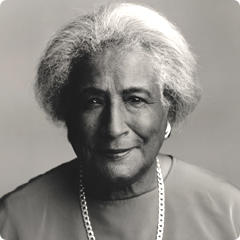Thursday, September 29, 2005
A Great One Gone to Glory: Civil Rights Lawyer Constance Baker Motley Dies

When I was about fifteen, I decided I wanted to be a lawyer. No one thought this was a good idea, and I received no encouragement...I was the kind of person who would not be put down.
-Constance Baker Motley
There are real heros. I know this to be true because of the freedoms I enjoy every day. Less than two generations ago Black people were living with the nightly terror of KKK Night Rides and murderous attacks against children. Its horrible to imagine even the daily humiliation of trying to find the nearest "colored" restroom. I think members of the Hip Hop generation too often forget the heroism and bravery of our ancestors and the horrors of the Jim Crow system. Maybe we're never told the story of how a generation of warriors, prophets, and heroes stood up against the American Aparteid system using civil disobedience, non-violence and the law. Their efforts laid the foundation for the freedoms we enjoy today and too often take for granted. And while recent events like Katrina have shown how much work remains to be done to achieve true equality for Black people in the U.S., I believe we can gain strength and courage for the fight from lives such as Judge Motley's.
It would be difficult to overestimate how important Judge Motley was as a jurist and civil right lawyer. She was the principle trial attorney for the NAACP Legal Defense team and argued in every major school desegregation case. Between the years of 1961-1964 she argued 10 times before the Supreme Court in civil rights cases and won 9! She argued landmark cases such as Brown v. Board of Education, the Central High School case in Arkansas and the case that let James Meredith enroll at the University of Mississippi. She was the first black woman appointed to the federal bench, as well the first one elected to the New York state Senate.

"From 1945 to 1964, Judge Motley worked on all of the major school segregation cases supported by the NAACP Legal Defense Fund. Among the cases in which she played a prominent role were desegregation cases involving the universities of Mississippi, Alabama, Florida, Oklahoma, Georgia, and Clemson College in South Carolina.
In the area of housing, Judge Motley represented African-American plaintiffs in public housing cases in Detroit and Benton Harbor, Mich.; St. Louis. Mo.; Columbus, Ohio; Evansville, Ind.; Schenectady, New York; and Savannah, Georgia.
Judge Motley was also counsel for African-American plaintiffs in the Jackson, Mississippi transportation facilities case which resulted in desegregating railroad and bus terminals and local buses in Jackson, Mississippi.
On October 16, 1961, Judge Motley argued Hamilton v. Alabama, involving the right to counsel in a capital case before the United States Supreme Court. Judge Motley also argued Swain v. Alabama before the Supreme Court in which the Court refused to proscribe race-based pre-emptory challenges in cases involving African-American defendants. Swain was overruled by Batson v. Kentucky.
On February 27, 1962, Judge Motley argued Turner v. City of Memphis before the United States Supreme Court, a case which resulted in desegregating the Dobbs Houses Restaurant in the Memphis Municipal Airport Terminal. On May 27, 1963, Judge Motley won the Supreme Court case of Watson v. City of Memphis, which required immediate desegregation of all recreational facilities in Memphis."


